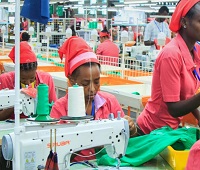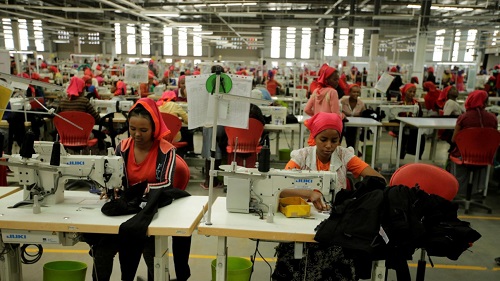"Giving tough competition to Bangladesh, Ethiopia has emerged strong as a sourcing destination for apparels. However, how much Bangladesh needs to fear its new rival is a question being raised by many experts. The Ethiopian government is investing lots of efforts in promoting its apparel industry. The country is investing in various economic incentives including construction of industrial parks for garment manufacturing besides positioning itself as one of the world’s top exporters of textile and garments."
 Giving tough competition to Bangladesh, Ethiopia has emerged strong as a sourcing destination for apparels. However, how much Bangladesh needs to fear its new rival is a question being raised by many experts. The Ethiopian government is investing lots of efforts in promoting its apparel industry. The country is investing in various economic incentives including construction of industrial parks for garment manufacturing besides positioning itself as one of the world’s top exporters of textile and garments.
Giving tough competition to Bangladesh, Ethiopia has emerged strong as a sourcing destination for apparels. However, how much Bangladesh needs to fear its new rival is a question being raised by many experts. The Ethiopian government is investing lots of efforts in promoting its apparel industry. The country is investing in various economic incentives including construction of industrial parks for garment manufacturing besides positioning itself as one of the world’s top exporters of textile and garments.
These efforts are reaping rich benefits as a range of international apparel brands including H&M, Calvin Klein and Tommy Hilfiger are setting up their factories for manufacturing low-cost garments in the new industrial parks. This has also boosted the country’s clothing exports aiming for to $30 billion a year by 2035 from its current $145 million.
Producing ethical, sustainable and eco-friendly products
The Ethiopian industry also needs to be applauded for offering abundant opportunities to its 105 million population wrecked by much publicised civil war, famines and droughts over the last 40 years. In this respect, the industry bears similarity to the Bangladesh RMG industry which has recorded exponential growth since its inception in the 1980’s.
droughts over the last 40 years. In this respect, the industry bears similarity to the Bangladesh RMG industry which has recorded exponential growth since its inception in the 1980’s.
Ethiopia has made rapid advances in producing ethical, sustainable, environmentally-sound apparel products. It has made significant investments in the sector over the years and has now reached a stage where it no longer needs to chase the bottom dollar on the product. Its garment exports are worth around $145 million which has taken the country several years of extremely hard promotion of its textile industry to reach such figures.
Low base wages, bureaucratic red tape pose challenge
However, the apparel industry in Ethiopia also faces several challenges. Government’s eagerness to attract foreign investment has led the country to promote the lowest base wage in any other garment-producing country. It has also promoted the availability of over three million acre for cotton cultivation so far. Out of this, 148,000 acres are being used as local farmers for manufacturing sugar, sesame, and other crops that yield higher cash. Hence, most local manufacturers are still compelled to import raw materials to make finished apparels.
The bureaucratic red tape, which was supposed to be untangled at the manufacturing parks in the country, still remains much in evidence. Exporters in the country are not allowed to consolidate smaller orders into one shipping container which results in shipment of partially full containers leading to a rise in transport costs.
Though, everything may not be currently right with the Bangladesh industry, its logistics including ports and associated infrastructures are exemplary. It now needs to improve product quality and integrity, enhance its sustainability initiatives and environmental credentials besides improving its logistical and infrastructural facilities.












